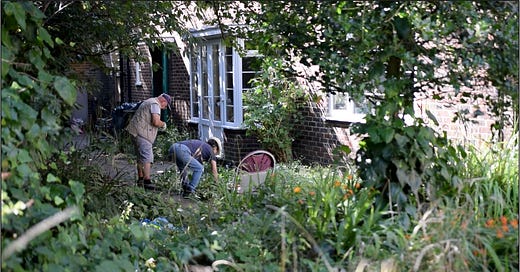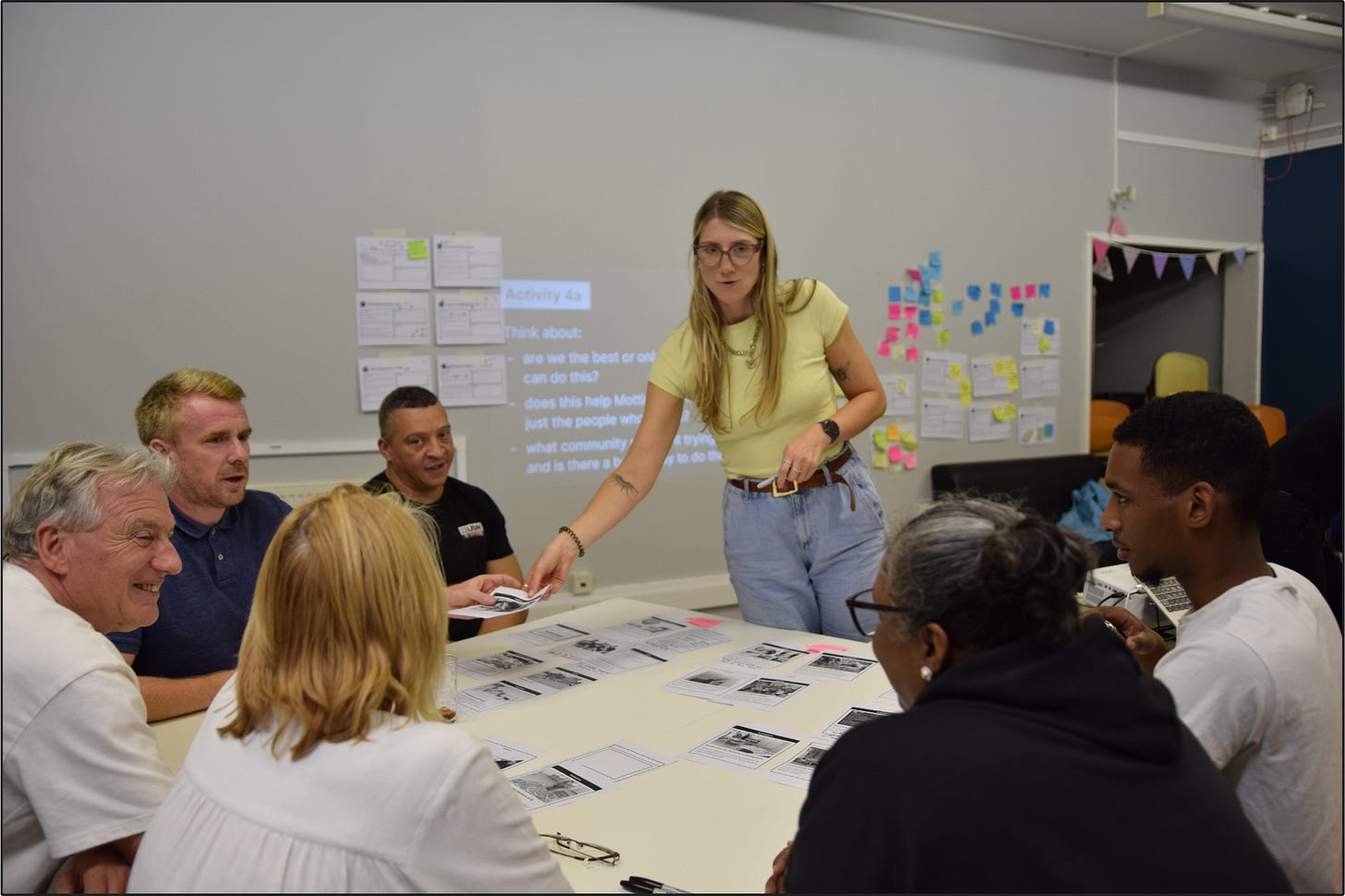Empowering a community to shape its own future: Mottingham Big Local
It’s in local communities where social crises are hardest felt, and where meaningful action has the greatest impact.
Over the last few months, we’ve been working with Mottingham Big Local Refocused (MBLR) on the final phase of their Big Local plan for the area. Working closely with MBLR, we’ve learned a lot about helping hyperlocal organisations make community-led decisions.
It’s in local communities where societal crises are felt, and where meaningful action has the greatest impact. So we were extremely keen to help MBLR in their work. Here’s how we did that, and some things we learned along the way.
Community funding done right
Big Local is a really good thing. It’s a National Lottery funding programme which has seen 150 communities around England granted at least £1 million. It has sought to fund communities that have been overlooked by government, and which face challenges like high unemployment and lack of community facilities among many others.
Crucially, though Big Local helps communities develop their plans, it doesn’t mandate how the money is spent. That’s for local groups to decide—and where engagement from the community is invaluable.
If you’ve been following our work, you’ll know that this is a funding model we can get behind. It empowers local communities—the people that best understand local needs because they’re their needs. And by breaking that funding into two phases, it means MBLR has the chance to take stock, learn from what has worked well, and re-assess community needs.
A community with challenges—and cohesion
Mottingham is a district in south-east London. It has one foot in the borough of Bromley and the other in Greenwich.
Nearly half of the people in Mottingham live in areas designated among the most 20% most deprived in England, as defined by the Ministry for Housing, Communities, and Local Government (as it then was) in 2019. Twice as many under 24s rely on the support of benefits than is the London average. A significant number of elderly members of the community face challenges with loneliness, and accessing vital services.
And yet, 84% of residents report being satisfied with their community, compared to a London average of 74%. Crime rates are comparatively low. As we engaged the community, what became clear was the almost tangible will to engage with and solve problems, and make life better for the community.
“Keeping the best parts going”
The current MBLR plan allocated spending between 2021 and 2023 and included initiatives like accessible community activities, art therapy in primary schools, support for skills and training, and a community garden.
This time, MBLR wanted a vision for 2024–2026 and beyond. They wanted to build on past successes and lay foundations for the future once the Big Local money runs out. Or in MBLR’s words, to “keep the best parts going”.
But they also wanted to do a few things differently. The 2021–2023 plan was presented in an information-dense 49-page report which few people are likely to have read. They also wanted to do everything possible to engage members of the community in the process. Though last time resident surveys were quite successful, drop-in sessions had a low turnout and low engagement from attendees.
“Lovely people, lovely area”
Community engagement was crucial to the success of this project. It’s something that’s really hard to get right. The kicker was that we only had 6 weeks to deliver the project, including the community research and engagement.
Engagement is never as easy as “if you workshop, they will come”. It takes time and it takes trust. We started with 1:1 sessions with resident members of the MBLR board before progressing to workshops. We worked hard to find dates and times that worked for as many people as possible, and we made sure the sessions were flexible and informal so people felt free to come and go.
Encouraging people to talk freely and openly is an art and a science. There are techniques you can apply, like providing 1:1 and small facilitated group settings, as people may feel more comfortable with one than the other. But at a granular level it also takes empathy and emotional intelligence to spot what’s working well, and what isn’t. Swapping participants between groups so they work with a mix of people can unlock new conversations and insights.
We also try to give people plenty of time to digest information, and share their thoughts 1:1 before having the option to talk to the whole group. Power dynamics are always a consideration, and particularly in whole-group settings. Some people can feel less comfortable writing thoughts down or sharing in public because of their class, race and life experience.
Despite the timeline, the community engagement was terrific. In particular, it was amazing to see the turnout for the second of the two workshops we ran, where 18 people came along and the engagement from everyone was fantastic. It was lovely to see young members of the community take part. Everyone was engaged in the workshop from start to finish. This was an improvement on past workshops where turnout and engagement was lower.
This time, people felt genuinely listened to and empowered. They wanted to come to the meetings to actively make decisions and contribute to the plan. There was always a will to do this, of course—but actually doing it isn’t so easy. It’s where experienced user researchers come into their own.
People enthused about so many aspects of Mottingham—particularly community spirit. “Lovely people, lovely area”, we heard. And people came up with fantastic ideas for using Big Local funds. These ideas didn’t just shape the plan—they became the plan.
Plans and stories
You’ll be able to see the MBLR plan online next year, along with a summary of our research and a budget breakdown.
Generally, the plan itself dials into priority areas health and wellbeing, economic empowerment, employability and green space. The community chest is a highlight for us. This will allow Mottingham residents to allocate funding for their own initiatives. And it’s been great to see MBLR grapple with a long-term plan of succession, identifying the need for a new organisation to continue the work beyond 2026.
The Mottingham Big Local film we made shows one of the workshops, and also the value of just some of MBLR’s work to date. There’s lovely footage from the weekly community brunches to support older members of the community, mobile boxing sessions for young people, and the community garden. People’s stories are the most powerful statement about the value of community-led initiatives. It was really lovely to talk to people about the value of MBLR’s work.
MBLR would like this kind of storytelling to continue, so if you’re local to Mottingham and are a writer, filmmaker or storyteller of any kind, do get in touch.
Some things we learned
This project validated some Interrobang ways of working.
Generally, our approach to user research and community engagement worked brilliantly. We were keen to involve Interrobang people located as near as possible to Mottingham. This minimises the costs and environmental impact of travel, and also brings cultural understanding and empathy to the project from day one.
We’ve learned it’s important for community groups to share their feedback, learnings and experiences when projects wrap up. We’re supporting this by being open to follow-up questions pro bono, including by leaving our project Slack channel open.
We saw the importance of getting everyone on the same page when it comes to deliverables and outcomes. These aren’t the same thing, and a take-away for us is to think about how we can do a better job of advocating for outcomes-oriented approaches in a clear, accessible way.
Though we got great engagement with our workshops, time was a massive limitation. Tight timelines are often the real-word reality. But six weeks wasn’t as much as was needed to engage with the community. More time allows more sessions and, crucially, time in between them to breathe, reflect and incubate ideas. With more time, we’d have loved to get involved in MBLR’s monthly board meetings to facilitate decision-making by residents, rather than on their behalf.
Most of all, we took away an even greater conviction in community-led initiatives which empower people in shaping their own destinies.
If you’ve been involved in a community-focused initiative, we’d love to hear what you think works well, and what doesn’t. Drop us a line: hello@interrobang.coop.









